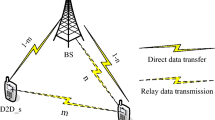Abstract
Device-to-device (D2D) relaying in a store-carry-forward manner can efficiently expand the transmission range of D2D traffic offloading in cellular systems, which needs external incentives to promote the cooperation of relay nodes who are tend to be selfish. Different to the existing incentive mechanisms which usually adopt large enough incentives, we propose a moderate incentive-compatible data forwarding mechanism based on the Markov decision process (MDP) framework with the principal-agent model. The main idea of this mechanism is to dynamically adjust the payment to incentivize the relay nodes to forward the data with an appropriate radius such that the system utility is maximized. Due to the curse of dimensionality in solving MDP, we propose a greedy algorithm which considers the past information only and further prove its optimality. For discussing the implementation of the proposed solution, we propose an infrastructure-assisted D2D relaying protocol for cellular systems. Simulation results show that our proposed moderate incentive mechanism can achieve a better performance on system utility compared to existing incentive mechanisms.









Similar content being viewed by others
References
Wu D, Cai YM, Hu RQY, Qian Y (2015) Dynamic distributed resource sharing for mobile D2D communications. IEEE Trans Wirel Commun 14(10):5417–5429
Liu P, Tao ZF, Lin ZN, Erkip E, Panwar S (2006) Cooperative wireless communications : A cross-layer approach. IEEE Wirel Commun Mag 13(4):84–92
Hakola S, Chen T, Lehtomaki J, Koskela T (2010) Device-to-device (D2D) communication in cellular network-performance analysis of optimum and practical communication mode selection
Laffont J, Martimort D (2001) The Theory of Incentives I: The Principal-agent Model. Princeton University Press, Princeton NJ, U.S.
Bolton P, Dewatripont M (2004) Contract Theory. MIT Press
Bo H, Pan H, Anil Kumar VS, Marathe MV, Shao JH, Aravind S (2011) Mobile Data Offloading through Opportunistic Communications and Social Participation. IEEE Trans Mob Comput 11(5):821–834
Apostolaras A, Iosifidis G, Chounos K, Korakis T (2015) C2M: Mobile data offloading to mesh networks. Proc IEEE GLOBECOM:4877–4883
Mehmeti F, Spyropoulos T Performance Analysis of Mobile Data Offloading in Heterogeneous Networks. IEEE Trans Mob Comput. to appear
Si P, He Y, Yao H, Yang R (2016) DaVe: Offloading Delay-Tolerant Data Traffic to Connected Vehicle Networks. IEEE Trans Veh Technol 65(6):3941–3953
Wang L, Peng T, Yang Y, Wang W (2012) Interference constrained relay selection of D2D communication for relay purpose underlaying cellular networks. Proc IEEE WiCOM
Vanganuru K, Ferrante S, Sternberg G (2012) System capacity and coverage of a cellular network with D2D mobile relays. Proc of IEEE MILCOM
Zhou B, Hu H, Huang S, Chen H (2013) Intracluster device-to-device relay algorithm with optimal resource utilization. IEEE Trans Veh Technol 62(5):2315–2326
Buttyn L, Dra L, Flegyhzi M, Vajda I (2010) Barter trade improves message delivery in opportunistic networks. Ad Hoc Netw 8(1):1–14
Li N, Das SK (2010) RADON: reputation-assisted data forwarding in opportunistic networks. Proc ACM International Workshop on Mobile Opportunistic Networking:8–14
Wang W, Chen L, Shin KG, Duan L (2014) Secure cooperative spectrum sensing and access against intelligent malicious behaviors. Proc IEEE INFOCOM
Wang W, Chen L, Shin KG, Duan L (2015) Thwarting intelligent malicious behaviors in cooperative spectrum sensing. IEEE Trans Mob Comput 14(11):2392–2405
Wen D, Cai Y, Li Z (2013) An incentive compatible two-hop multi-copy routing protocol in DTNs. Proc IEEE MSN:140–146
Shevade U, Song H, Qiu L, Zhang Y (2008) Incentive-aware routing in DTNs. Proc ICNP:238–247
Brun O, El-Azouzi R, Prabhu B, Seregina T (2014) Modeling rewards and incentive mechanisms for Delay Tolerant Networks. International Symposium on Modeling and Optimization in Mobile Ad Hoc, and Wireless Networks:233–240
Li P, Guo S (2015) Incentive mechanisms for device-to-device communications. IEEE Netw 29(4):75–79
Zhang Y, Song L, Saad W, Dawy Z, Han Z (2015) Contract-Based Incentive Mechanisms for Device-to-Device Communications in Cellular Networks. IEEE J Sel Areas Commun 33(10):1–1
Mastronarde N, Patel V, Xu J, Van DSM (2013) Learning relaying strategies in cellular D2D networks with token-based incentives. IEEE Globecom Workshops:163–169
Sun Q, Tian L, et al. (2015) Energy efficient incentive resource allocation in D2D cooperative communications. Proc IEEE ICC:2632–2637
Camp T, Boleng J, Davies V (2002) A survey of mobility models for ad hoc network research. Wirel Commun Mob Comput 2(5):483–502
Lu Y, Wang W, Chen L, Zhang Z, Huang A (2014) Distance-based energy-efficient opportunistic forwarding in mobile delay tolerant networks. Proc IEEE ICC:3564–3569
Groenevelt R, Nain P, Koole G (2005) The message delay in mobile ad hoc networks. Perform Eval 62 (1-4):210–228
Qin YH (2012) A stackelberg-game model in a two-stage supply chain. Syst Eng Procedia 3:268–274
Li S, Zheng ZZ, Ekici E, Shroff NB (2013) Maximizing social welfare in operator-based Cognitive Radio Networks under spectrum uncertainty and sensing inaccuracy. Proc of IEEE INFOCOM
Wang W, Lau VKN (2014) Delay-aware cross-layer design for device-to-device communications in future cellular systems. IEEE Commun Mag 52(6):133–139
TAPASCologne project. http://sourceforge.net/apps/mediawiki/sumo/index.php? title=TAPASCologn
Acknowledgments
This work is supported in part by National Natural Science Foundation of China (No. 61571396), Zhejiang Provincial Natural Science Foundation of China (No. R17F010006), and National Hi-Tech R&D Program (No. 2014AA01A702).
Author information
Authors and Affiliations
Corresponding author
Rights and permissions
About this article
Cite this article
Zhou, X., Wang, W., Wang, Y. et al. Moderate Incentive Design for Delay-Constrained Device-to-Device Relaying. Mobile Netw Appl 22, 577–588 (2017). https://doi.org/10.1007/s11036-016-0767-8
Published:
Issue Date:
DOI: https://doi.org/10.1007/s11036-016-0767-8




